Why Is My Betta Fish Not Eating
Why is my betta fish not eating?, that a question We hear a lot.
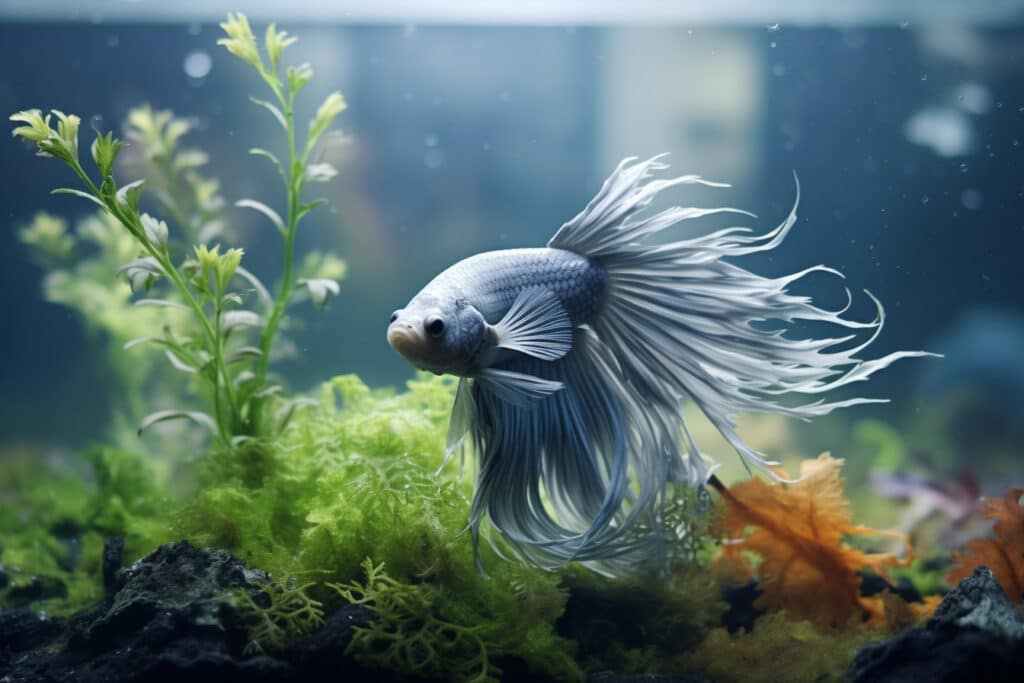
Imagine this: You’ve lovingly set up an aquarium for your new Betta fish, making sure it has everything it needs, from an appropriate-sized tank, a heater, and a filter, to all the fun decorations that make your Betta’s home beautiful and engaging.
But one day, your vibrant little friend just stops eating. No matter what you do, it shows no interest in its food. This scenario, while worrisome, is not uncommon. It raises the critical question: “Why is my Betta fish not eating?”
In this comprehensive blog post, we will delve into the possible reasons behind your Betta’s sudden loss of appetite. We will explore the typical eating habits of these colorful creatures, the common reasons they might stop eating, how to diagnose and treat this issue, and preventative measures you can take to avoid it.
This guide aims to provide you with insights and practical solutions to ensure the health and happiness of your fish friend. Understanding our aquatic pets, their behavior, and how to best care for them is a rewarding journey.
So, without further ado, let’s dive into the fascinating world of Betta fish and unravel the mystery of their eating habits.
Table of Contents 🦑
Understanding Why is My Betta Fish Not Eating
Betta fish, also known as Siamese fighting fish, is a tropical fish originating from the warm waters of Southeast Asia.
To tackle the problem of a betta fish refusing food, it’s crucial first to understand their dietary requirements. In the wild, male betta fish and female bettas are carnivores, feeding on insects and mosquito larvae on the water’s surface. Their upward-facing mouths and eyes are an adaptation to this type of feeding. In an aquarium setting, Bettas generally eat a variety of commercially available Betta-specific pellets, freeze dried food, or frozen food.
Just like any other living creature, a Betta’s appetite can vary. There may be days when your Betta fish is simply not as hungry as other days. However, consistent refusal of food is generally a sign that something might be amiss, and it’s essential to figure out what could be causing this change.
The Importance of a Protein-Rich Diet
A protein-rich diet is essential for your betta’s health.
Commercially available betta pellets are often formulated with this in mind, containing a high percentage of meat-based ingredients.
Live or freeze-dried foods such as brine shrimp, daphnia, and bloodworms also make excellent additions to your betta’s diet, offering variety and closely mimicking their natural food sources.
Quantity and Frequency of Feeding
Bettas should be fed a small amount once or twice a day. Overfeeding can lead to obesity and other health issues, and uneaten food left in the betta’s tank can decay, negatively impacting the water quality.
On the other hand, underfeeding can lead to malnutrition and weaken your betta’s immune system. A good rule of thumb is to feed your betta only what it can consume in about 2 minutes.
The Unique Feeding Habits
Understanding the unique feeding habits of bettas can help you identify when a change in eating behavior may indicate a problem. While it’s normal for a betta to occasionally refuse a meal or show a preference for certain types of food, consistent refusal to eat is a cause for concern.
Why Betta Fish Might Stop Eating
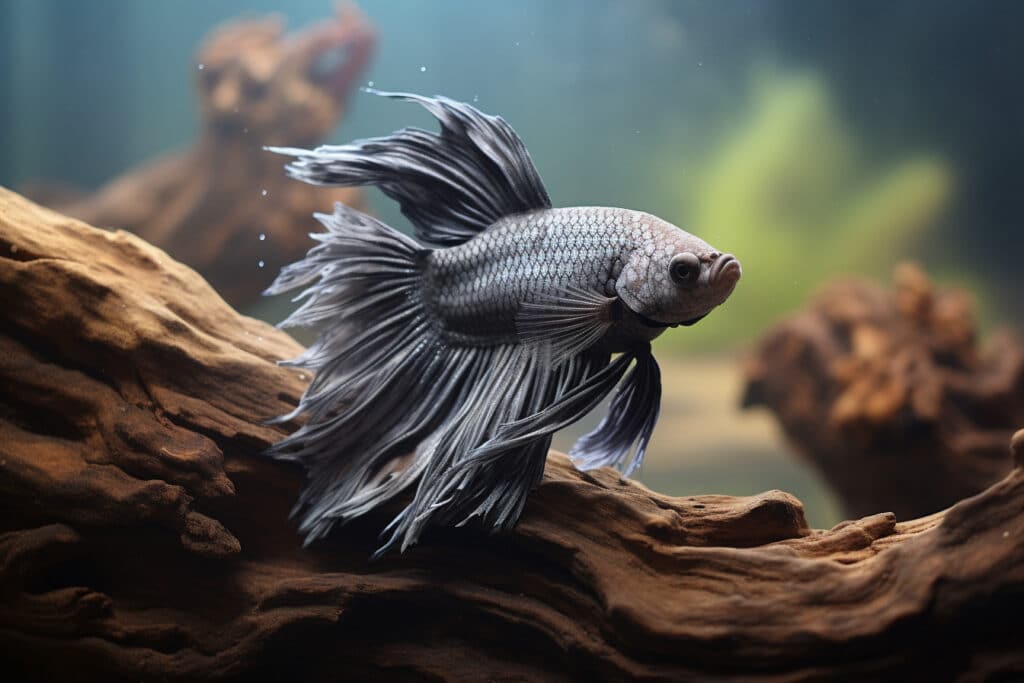
Betta fish are known for their vibrant colors, unique personality traits, and active lifestyles, and they require a nutritious diet to maintain these characteristics.
Usually, betta fish eagerly approach feeding time. If your betta fish suddenly stops eating or shows less interest in food than usual, this can be a sign of various underlying issues.
Stress and Its Impact on Eating Habits
One of the most common reasons a betta fish might stop eating is stress. Just like in humans, stress in fish can suppress their appetite.
Factors that might stress a betta fish include poor water conditions, drastic changes in water temperature, inadequate tank size, lack of hiding spaces, or aggressive tank mates. It’s crucial to provide a comfortable, stable environment for your betta fish to ensure they remain stress-free and healthy.
Illnesses and Parasites
As betta fish age, they may naturally begin to eat less. Bettas have an average lifespan of 2-5 years, and as they approach the end of their life, it’s not uncommon for them to show a decline in appetite.
However, it’s still essential to ensure they are receiving the nutrients they need and that any decrease in food intake isn’t a sign of illness.
Environmental Changes
If you have recently changed something in your betta’s environment, such as the tank setup or water parameters, this could cause your betta fish to stop eating. A sudden change in temperature or water parameters can cause stress, leading to loss of appetite.
Diet-Related Causes
Lastly, your betta fish’s diet could be the root cause of its refusal to eat. Providing a varied, balanced diet is essential to keep your betta fish healthy and willing to eat. too much food, feeding cheap food, poor quality food, or lack of dietary variety can all lead to your betta fish refusing food.
Identifying the Root Cause of Your Betta Fish Not Eating
Observation is a key part of identifying why your betta fish has stopped eating. You need to pay close attention to your fish’s behavior and physical appearance. Has it become less active? Does it have trouble swimming or does it hide more often than usual? These could be signs that something is wrong.
Observation is Key
One of the most important things you can do is observe your betta fish. Watch its behavior, the way it interacts with its environment, and other signs that may indicate something is wrong. We will guide you on what to look out for when observing your betta fish.
Changes in Physical Appearance
Physical changes can indicate a number of issues. For example, faded colors, bloating, or white spots could all suggest an underlying health problem.
Look for clamped fins, which are a common sign of stress or illness in betta fish. If you notice any of these symptoms, it’s vital to address the potential problem promptly.
Analyzing Water Conditions
Check the conditions of your betta’s water. Poor water quality is a common cause of stress and disease in betta fish.
Test your water regularly to ensure the pH, temperature, and ammonia, nitrite, and nitrate levels are within the suitable range for bettas. Using an aquarium test kit can help you determine if there are any issues with your tank’s water parameters.
Feeding Patterns and Diet
Your betta fish’s feeding patterns and diet could also be causing it to stop eating. Are you providing a varied diet?
Are you feeding it the right amount? Overfeeding can lead to bloating and constipation, which may cause your betta to stop eating. On the other hand, a lack of variety in your betta’s diet could make it lose interest in food.
Consulting a Veterinarian
If you’ve exhausted all the potential causes and your betta fish is still not eating, it may be time to consult a veterinarian. They can provide professional insight and potentially diagnose an illness that you may have overlooked.
Once you’ve identified the problem, it’s time to take action. In the following sections, we will explore the various treatment options and preventive measures to help your betta fish start eating again.
Treatment and Prevention
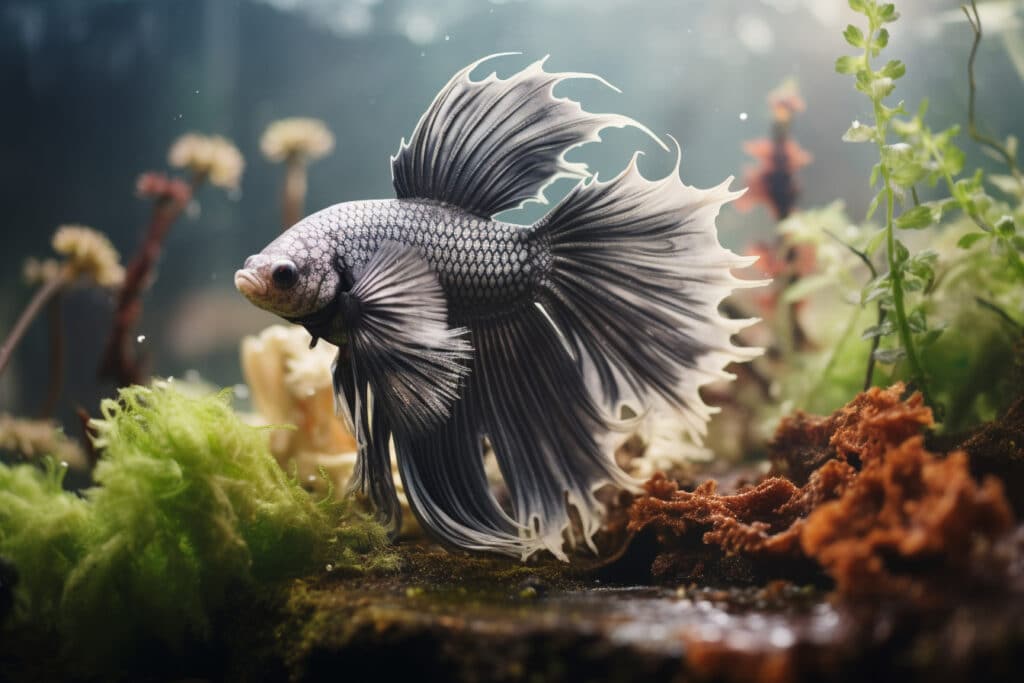
In this section, we will discuss the various treatment and prevention strategies you can employ once you’ve identified the reason behind your betta fish not eating. Remember, a healthy betta fish is a happy betta fish, and proper care and maintenance are key to ensuring your pet’s well-being.
Adjusting the Diet
Adjusting the diet of your Betta fish can be a crucial step in addressing the issue of not eating.
Betta fish are carnivorous by nature, and their diet should primarily consist of high-quality Betta-specific food. However, if your Betta fish is not showing interest in its current diet, it may be time to introduce some dietary adjustments.
Consider offering a variety of food options, such as freeze-dried or frozen bloodworms, brine shrimp, or daphnia. These live or frozen foods can entice your Betta fish to eat and provide essential nutrients.
Additionally, you can try feeding small portions multiple times a day rather than a single large meal. Remember to monitor their response to the dietary changes and ensure they are getting a balanced diet. Gradual adjustments to the diet can help stimulate their appetite and promote healthy eating habits.
Altering Tank Conditions
Sometimes, a change in your tank’s conditions can stimulate your betta fish’s appetite. This could involve adjusting the water temperature, improving the water quality, or making the environment more stimulating for your betta fish.
Medication and Medical Treatment
If your Betta fish’s loss of appetite persists despite environmental adjustments and dietary changes, it may be necessary to explore medication and medical treatment options.
Consulting with a knowledgeable veterinarian who specializes in fish health is highly recommended. They can conduct a thorough examination and provide appropriate medications, such as antibiotics or antiparasitic treatments if an underlying health issue is suspected.
It’s essential to follow the veterinarian’s instructions carefully and administer the medication as directed. Additionally, they may recommend specific tests to determine the exact cause of appetite loss and tailor the treatment accordingly.
Remember to closely monitor your Betta fish’s response to the medication and seek further guidance from the veterinarian if necessary. Medication and medical treatment can play a crucial role in addressing underlying health conditions and helping your Betta fish regain its appetite and overall well-being.
Preventive Measures
Prevention is better than cure. preventive measures are key to ensuring your Betta fish maintains a healthy appetite. By implementing a few simple steps, you can help prevent future episodes of appetite loss.
First and foremost, maintain a clean and well-maintained tank by regularly performing water changes and monitoring water parameters. A stable and suitable environment is crucial for their overall health.
Patience is Key
Finally, remember that patience is key when dealing with a betta fish that’s not eating. Sometimes, all your pet needs is a little time to adjust to a new environment or recover from an illness. Don’t rush the process, be patient and provide your betta fish with the care and support it needs.
Case Study: A Betta Fish That Stopped Eating
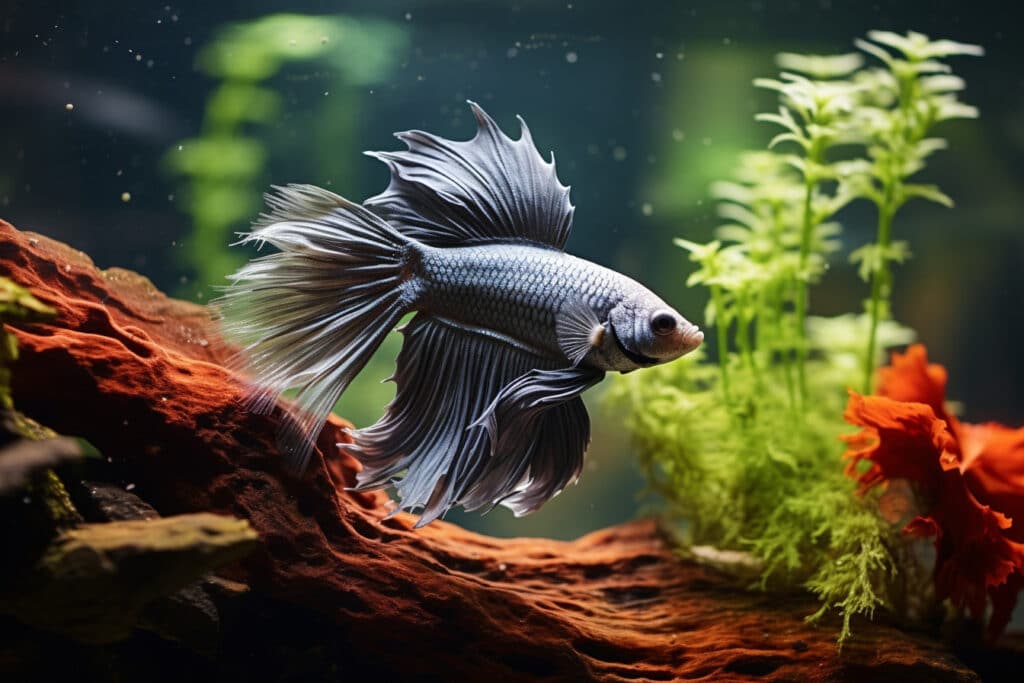
Let’s dive into a practical example to better illustrate the process of determining the cause of a betta fish not eating, and the steps taken to rectify the situation.
By applying the theories and techniques discussed earlier, we can explore how these play out in a real-life scenario.
The Issue
We will start by detailing the initial observation of the problem: the betta fish refusing to eat. The signs, symptoms, and changes in behavior noted will be described to give you an idea of what you might witness in your own aquarium.
Diagnosis
Next, we will explore how the cause of the problem was determined. This will involve recounting the examination process, testing, and observations that helped pinpoint the reason for the betta fish’s loss of appetite.
Treatment
Once the cause was identified, an appropriate treatment plan was put into place. We will outline the steps taken to help the betta fish regain its appetite, ranging from changes in diet and environment to medical intervention if necessary.
Outcome
The result of the intervention and the subsequent behavior of the betta fish will be detailed. This will provide insight into how effective the treatment was and what signs you should look out for to confirm improvement in your betta fish’s condition.
In conclusion, the case study will wrap up with some key takeaways and learnings from the experience, providing you with additional knowledge and tools to manage similar situations.
Reintroducing Food to Your Betta Fish
Getting your Betta fish to eat again will require patience, understanding, and the correct approach. Once you have identified and addressed the reason behind their lack of appetite, reintroducing food must be done carefully to ensure success.
The Ideal Betta Fish Diet
Before reintroducing food, it’s important to understand what makes a healthy and balanced diet for your Betta fish. Detailing the preferred food options, nutritional needs, and feeding habits will ensure you are providing the best possible meals for your Betta.
Choosing the Right Betta Food
A closer look at the various types of Betta fish food available in your local fish store and in the market will help you make an informed choice.
Reintroducing Food Slowly
The process of reintroducing food must be gradual to avoid overwhelming your Betta fish or causing further health issues.
Preventing Future Eating Issues
Finally, look at the steps you can take to prevent your Betta fish from refusing food in the future. By maintaining a healthy diet and stress-free environment, you can greatly reduce the chances of your Betta fish developing eating issues again.
The Role of Veterinary Consultation in Managing Betta Fish Eating Issues
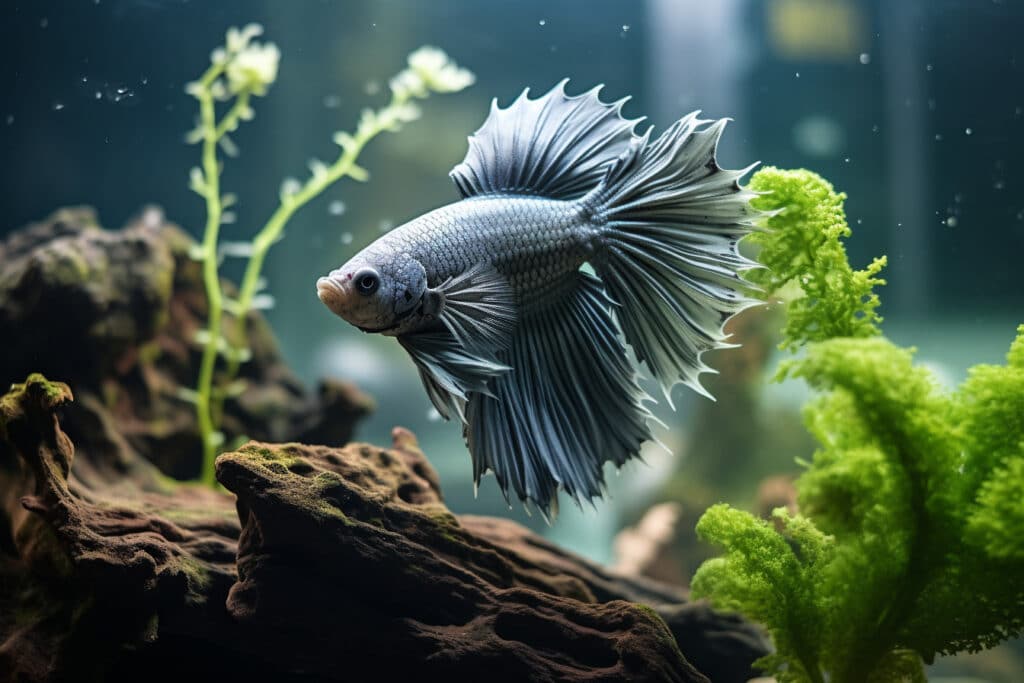
For persistent eating problems, it is advisable to consult a veterinary professional who specializes in aquatic animals. This portion will provide insights into when and why it might be necessary to seek a professional opinion.
Signs That You Need Professional Help
While you can address many issues with your Betta fish at home, there are certain signs that indicate you may need professional help from a veterinarian who specializes in fish health. If you notice any of the following signs, it’s important to seek veterinary assistance:
Persistent Loss of Appetite: If your Betta fish consistently refuses to eat or shows a prolonged lack of interest in food despite your efforts to address the issue, it may indicate an underlying health problem that requires veterinary attention.
Visible Signs of Illness: Observe your Betta fish for any visible signs of illness, such as discoloration, lesions, fin damage, or abnormal growth. These signs can indicate an underlying infection or disease that may require veterinary diagnosis and treatment.
Abnormal Behavior: Watch for unusual behavior, such as lethargy, excessive hiding, erratic swimming patterns, or difficulty breathing. These behavioral changes can be indicative of an underlying health issue that needs professional assessment.
Deteriorating Condition: If your Betta fish’s overall condition is worsening, despite your best efforts to address the problem, it’s crucial to seek veterinary assistance promptly. This includes symptoms like rapid weight loss, deteriorating fin condition, or a general decline in activity and vitality.
Unresolved Issues: If you have followed recommended care guidelines, made necessary adjustments, and implemented treatments but still do not see any improvement in your Betta fish’s condition, professional help is advisable.
Remember, a veterinarian who specializes in fish health can provide a comprehensive examination, accurate diagnosis, and appropriate treatment options tailored to your Betta fish’s specific needs. Early intervention and professional guidance can greatly increase the chances of a successful resolution and a return to good health for your beloved Betta fish.
What to Expect from a Veterinary Consultation
A veterinary consultation for your Betta fish can provide valuable insights and guidance in addressing their loss of appetite. During the consultation, the veterinarian will conduct a thorough examination of your fish, including observing their behavior, checking for any visible signs of illness, and possibly performing diagnostic tests if necessary.
Implementing Veterinary Recommendations
Implementing changes or treatment regimens suggested by a veterinary professional is crucial to improving your Betta fish’s appetite and overall health. Here are some tips to help you successfully carry out their recommendations:
Follow Instructions Carefully: Carefully read and understand all instructions provided by the veterinarian. Follow their guidance regarding medication administration, dosage, and frequency.
Create a Routine: Establish a consistent routine for feeding, administering medication, and any other recommended treatments. This helps your Betta fish adjust to the changes and ensures that you stay consistent with their care.
Monitor Progress: Keep a close eye on your Betta fish’s response to the changes or treatments. Monitor their behavior, appetite, and overall condition. Note any improvements or setbacks and communicate them with the veterinarian during follow-up appointments.
Maintain Water Quality: Ensure that your Betta fish tank is clean and well-maintained. Regularly test the water parameters and perform necessary water changes. Clean the tank and filter as recommended. Maintaining optimal water quality promotes overall health and supports appetite.
Provide a Suitable Environment: Create a stress-free environment for your Betta fish. Ensure appropriate water temperature, proper tank size, and adequate hiding spots. Minimize disturbances and keep their environment calm and quiet.
Stick to a Balanced Diet: Follow the veterinarian’s recommendations regarding the type and amount of food to feed your Betta fish. Provide a varied and nutritious diet that meets their dietary needs.
Communicate with the Veterinarian: Keep the veterinarian updated on your Betta fish’s progress. If you have any concerns or questions, don’t hesitate to reach out for clarification or additional guidance.
Be Patient: Remember that healing and improvement take time. It may take a while for your Betta fish’s appetite to fully recover. Stay patient, consistent, and attentive to their needs throughout the process.
By following these tips and maintaining open communication with the veterinarian, you can increase the likelihood of successful treatment and enhance your Betta fish’s appetite and overall well-being.
Long-Term Management and Care
Lastly, the importance of continuous care and monitoring for your Betta fish, even after the eating issues have been resolved, ensures a happy and healthy life for your aquatic pet. This includes a regular checkup schedule, dietary management, and maintaining a suitable environment in the fish tank.
Frequently Asked Questions
Q: Why is my Betta fish not eating?
A: There can be various reasons why your Betta fish is not eating. It could be due to stress, illness, unsuitable food, poor water conditions, or even a change in environment. Identifying the underlying cause is crucial in addressing the issue.
Q: How long can a Betta fish go without eating?
A: While Betta fish can survive for some time without food, it is not ideal for their health. It is recommended to address the eating issue promptly to prevent any complications. Regular feeding is essential for their overall well-being.
Q: What should I do if my Betta fish stops eating?
A: Start by examining the water parameters, temperature, and food you are offering. Ensure a clean and suitable environment, varied and nutritious food, and monitor for any signs of illness. If the issue persists, consult a veterinarian for further guidance.
Q: Should I be concerned if my Betta fish spits out its food?
A: It’s not uncommon for Betta fish to spit out their food, especially if it is too large or unfamiliar. However, if they consistently refuse to eat or show other signs of illness, it’s essential to investigate further to rule out any underlying issues.
In conclusion, understanding why your Betta fish is not eating is essential for their well-being and overall health. By recognizing the potential causes, conducting a thorough assessment, and implementing appropriate changes or treatments, you can help restore their appetite and promote a healthy feeding routine.
Remember to monitor their behavior, observe any signs of illness, and seek professional help when needed. Maintaining a clean and suitable tank environment, providing a balanced diet, and minimizing stressors are key elements in supporting their appetite and overall health.
With patience, diligence, and proper care, you can help your Betta fish regain their appetite and enjoy a vibrant and thriving life.
Thank You: We would like to express our sincere gratitude for taking the time to read this comprehensive guide on why your Betta fish may not be eating. We hope that the information provided has been helpful in understanding the potential causes and offering insights into addressing the issue.

Delighted to have you here at BettaReef! This place is a treasure trove of knowledge about Betta fish, Betta Care, Health, Gear, and much more from the wonders of aquatic life. My journey in this fascinating world began when I was just 8, and now, as a seasoned hobbyist, I’m here to help fellow Betta enthusiasts create a thriving Betta environment for a healthy life.
I’m committed to delivering high-quality content, backed by a stringent editorial process. Each product review is based on real-life usage and practical analysis, ensuring that you get insights and advice that truly matter.
Related Blog Posts:

The Best Food For Betta Fish Top 5
Swim To 🤿 Home The Best Food For Betta Fish Top 5 Best Overall Fluval

How Long Can Betta Fish Go Without Food?
Swim To 🤿 Home How Long Can Betta Fish Go Without Food? In the bustling

Betta Fish Food Types
Swim To 🤿 Home Betta Fish Food Types Welcome to the underwater Betta culinary adventure!
